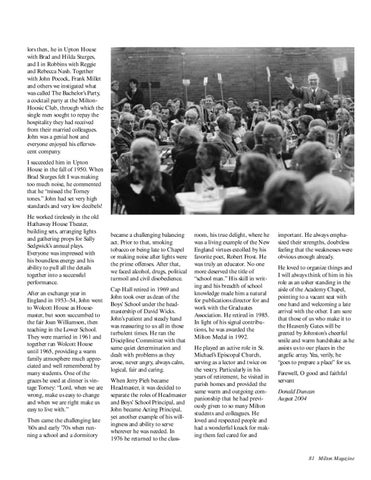lors then, he in Upton House with Brad and Hilda Sturges, and I in Robbins with Reggie and Rebecca Nash. Together with John Pocock, Frank Millet and others we instigated what was called The Bachelor’s Party, a cocktail party at the MiltonHoosic Club, through which the single men sought to repay the hospitality they had received from their married colleagues. John was a genial host and everyone enjoyed his effervescent company. I succeeded him in Upton House in the fall of 1950. When Brad Sturges felt I was making too much noise, he commented that he “missed the Torney tones.” John had set very high standards and very low decibels! He worked tirelessly in the old Hathaway House Theater, building sets, arranging lights and gathering props for Sally Sedgwick’s annual plays. Everyone was impressed with his boundless energy and his ability to pull all the details together into a successful performance. After an exchange year in England in 1953–54, John went to Wolcott House as Housemaster, but soon succumbed to the fair Joan Williamson, then teaching in the Lower School. They were married in 1961 and together ran Wolcott House until 1965, providing a warm family atmosphere much appreciated and well remembered by many students. One of the graces he used at dinner is vintage Torney: “Lord, when we are wrong, make us easy to change and when we are right make us easy to live with.” Then came the challenging late ’60s and early ’70s when running a school and a dormitory
became a challenging balancing act. Prior to that, smoking tobacco or being late to Chapel or making noise after lights were the prime offenses. After that, we faced alcohol, drugs, political turmoil and civil disobedience. Cap Hall retired in 1969 and John took over as dean of the Boys’ School under the headmastership of David Wicks. John’s patient and steady hand was reassuring to us all in those turbulent times. He ran the Discipline Committee with that same quiet determination and dealt with problems as they arose, never angry, always calm, logical, fair and caring. When Jerry Pieh became Headmaster, it was decided to separate the roles of Headmaster and Boys’ School Principal, and John became Acting Principal, yet another example of his willingness and ability to serve wherever he was needed. In 1976 he returned to the class-
room, his true delight, where he was a living example of the New England virtues extolled by his favorite poet, Robert Frost. He was truly an educator. No one more deserved the title of “school man.” His skill in writing and his breadth of school knowledge made him a natural for publications director for and work with the Graduates Association. He retired in 1985. In light of his signal contributions, he was awarded the Milton Medal in 1992. He played an active role in St. Michael’s Episcopal Church, serving as a lector and twice on the vestry. Particularly in his years of retirement, he visited in parish homes and provided the same warm and outgoing companionship that he had previously given to so many Milton students and colleagues. He loved and respected people and had a wonderful knack for making them feel cared for and
important. He always emphasized their strengths, doubtless feeling that the weaknesses were obvious enough already. He loved to organize things and I will always think of him in his role as an usher standing in the aisle of the Academy Chapel, pointing to a vacant seat with one hand and welcoming a late arrival with the other. I am sure that those of us who make it to the Heavenly Gates will be greeted by Johnston’s cheerful smile and warm handshake as he assists us to our places in the angelic array. Yea, verily, he “goes to prepare a place” for us. Farewell, O good and faithful servant Donald Duncan August 2004
81 Milton Magazine
